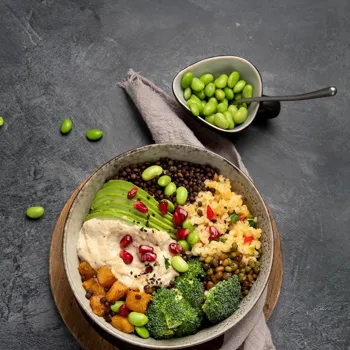Exploring Benefits of Plant-Based Diets: A Delicious Journey Awaits! Discover the health, environmental, and culinary perks within!
In India, food isn't just about sustenance; it's a cultural cornerstone,
deeply entwined with tradition, religion, and family. While our culinary landscape boasts a vibrant array of vegetarian dishes, a growing number of Indians are now exploring the realm of plant-based diets.

But what exactly does "plant-based" mean, and is it truly a healthier option for everyone? Let's delve into the world of plant-based eating, its potential benefits, and whether it's the right fit for your lifestyle.
Plant-based diet emphasizes whole plant foods, adaptable to individual needs
A plant-based diet, at its core, emphasizes foods derived from plants. This includes fruits, vegetables, legumes (beans, lentils, chickpeas), nuts, seeds, and whole grains. It doesn't necessarily mean strict vegetarianism or veganism, although those are forms of plant-based eating.
A flexible plant-based approach may include small amounts of animal products like dairy, eggs, or fish on occasion, while a stricter vegan diet eliminates all animal products entirely.
The beauty of plant-based eating lies in its adaptability – you can tailor it to your individual needs and preferences. The focus is on maximizing whole, unprocessed plant foods while minimizing processed foods, added sugars, and unhealthy fats.
Many people discover a renewed appreciation for the incredible variety and flavours that the plant kingdom offers. Before making radical changes, it's always wise to consult a doctor or registered dietitian, especially if you have underlying health conditions.
They can help you create a plan that meets your specific needs and ensures you're getting all the necessary nutrients.
Plant-based diets offer numerous health benefits due to high fiber, vitamins, antioxidants
One of the most compelling reasons people embrace plant-based diets is the wealth of health benefits associated with them. Studies have shown that individuals who consume predominantly plant-based foods tend to have lower risks of heart disease, type 2 diabetes, certain types of cancer, and obesity.
This is largely attributed to the high fibre content, abundance of vitamins and minerals, and presence of antioxidants in plant-based foods. Fibre, for instance, helps regulate blood sugar levels, promotes healthy digestion, and lowers cholesterol.
Antioxidants protect our cells from damage caused by free radicals, which are implicated in aging and chronic diseases.
A well-planned plant-based diet can provide all the essential nutrients the body needs, including protein, iron, calcium, and vitamin B12 (though supplementation may be necessary for vegans to ensure adequate B12 intake).
Don't underestimate the power of incorporating more fruits and vegetables into your meals. Simple swaps, like adding spinach to your dal or choosing a fruit salad over a sugary dessert, can make a significant difference over time. Variety is key to a healthy and balanced plant-based diet.
Plant-based diets benefit the environment, reduce impact on planet, promote sustainability
Beyond personal health, plant-based diets also offer significant environmental benefits. Animal agriculture is a major contributor to greenhouse gas emissions, deforestation, and water pollution.
By reducing our consumption of animal products, we can lessen our impact on the planet and contribute to a more sustainable food system. Plant-based agriculture generally requires fewer resources, such as land, water, and energy, compared to animal agriculture.
Choosing plant-based options can also help protect biodiversity by reducing the need for land clearing and habitat destruction.
The environmental impact of our food choices is significant, and shifting towards a more plant-based way of eating is a tangible step we can take to make a positive difference. It's about making informed choices and aligning our eating habits with our values.
We are seeing that a number of farmers are also shifting to plant-based agriculture, and these are encouraging signs.
Transition to plant-based diet: start gradually, try new recipes, explore protein sources
For those looking to transition to a plant-based diet, the key is to start gradually and make sustainable changes. Begin by incorporating more plant-based meals into your weekly routine. Try swapping a meat-based dish for a vegetarian one, like a lentil curry or a vegetable stir-fry.
Explore different plant-based recipes and cuisines to discover new flavours and dishes you enjoy. Familiarize yourself with plant-based protein sources, such as lentils, chickpeas, kidney beans, tofu, tempeh, and quinoa.
These can be used in a variety of dishes to create satisfying and nutritious meals. Don't be afraid to experiment with different spices and herbs to enhance the flavour of your plant-based creations. Remember, it's a journey, not a race.
Be patient with yourself and focus on making progress, not perfection. Embrace the opportunity to learn about new foods and cooking techniques.
Plant-based diet can be delicious and fulfilling
A well-planned plant-based diet can be incredibly delicious and fulfilling.

Plant-based diets debunked: myths on protein, cost, taste
It is also important to address some common myths and misconceptions surrounding plant-based diets. One prevalent myth is that plant-based diets are inherently protein deficient. However, with mindful planning, it's entirely possible to obtain adequate protein from plant-based sources.

Legumes, nuts, seeds, and whole grains are all excellent sources of protein. Another misconception is that plant-based diets are expensive. While some specialized plant-based products can be pricey, staple plant foods like lentils, beans, and seasonal vegetables are often more affordable than meat.
Planning your meals around seasonal produce and buying in bulk can help keep costs down. It's also important to dispel the myth that plant-based diets are bland or restrictive. With creativity and the right recipes, plant-based meals can be incredibly flavourful, diverse, and satisfying.
There are countless delicious plant-based recipes available online and in cookbooks, catering to various tastes and cuisines. Don't let these misconceptions deter you from exploring the potential benefits of plant-based eating.
Choosing a plant-based diet is a personal decision for health, ethics, and sustainability
Ultimately, deciding whether a plant-based diet is right for you is a personal choice. Consider your individual health goals, ethical values, environmental concerns, and lifestyle preferences.
If you're unsure, consult with a healthcare professional or registered dietitian who can provide personalized guidance and address any concerns you may have.
Start slowly, experiment with different plant-based recipes, and focus on making sustainable changes that you can maintain over the long term.
Whether you adopt a fully vegan diet or simply incorporate more plant-based meals into your routine, you're taking a step towards a healthier you and a more sustainable planet. Remember, every small change counts, and the journey towards plant-based eating can be a delicious and rewarding one.
Embrace the new and nutritious way of living, focusing on whole foods and ensuring you have all that you need to get fulfilled.
AI Generated Content. Glance/InMobi shall have no liability for the content










